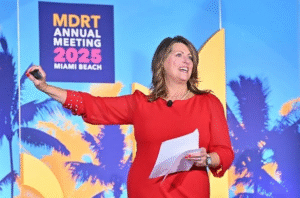How Being Brave Plays An Important Role In Leadership
A leader is one who knows the way, goes the way, and shows the way.” – John C. Maxwell
(These are thoughts taken from a focus session that I was honored to lead at the MDRT 2025 Annual Meeting.)
 Leadership is brave because it requires stepping into uncertainty, making hard choices, and showing up with integrity—even when it’s uncomfortable.
Leadership is brave because it requires stepping into uncertainty, making hard choices, and showing up with integrity—even when it’s uncomfortable.
And I’ve learned that great leaders choose courage over comfort, again and again.
How do they make that choice?
Let’s break it down:
1 – Facing the Unknown
Leaders often have to make decisions without knowing how things will turn out.
- They take responsibility for outcomes—good or bad.
- They set direction without guarantees.
- Bravery is choosing to move forward anyway, with vision and conviction
2 – Owning the Hard Conversations
Brave leaders…
- Give honest feedback.
- Set clear boundaries.
- Address conflict head-on.
- These moments are uncomfortable—but they build trust, clarity, and accountability.
3 – Looking in the Mirror First
True leaders…
- Examine their own blind spots.
- Admit mistakes.
- Stay teachable.
- This takes vulnerability, which is a radical form of courage in leadership.
 4 – Standing Alone (Sometimes)
4 – Standing Alone (Sometimes)
Leadership often means…
- Making unpopular decisions.
- Holding the line on values, even under pressure.
- Advocating for what’s right, not what’s easy.
- That kind of integrity requires backbone, not just strategy.
5 – Believing in People
It takes courage to…
- Trust others to rise.
- Empower instead of control.
- Let go of being the smartest person in the room.
- Brave leaders build other leaders. That’s legacy work—not ego work.
6 – Leading with Heart
It’s brave to…
- Lead with compassion, not just command.
- Care deeply about people and still make hard calls.
- Hold both results and relationships as essential.
- It’s not weak—it’s the strongest form of leadership there is.
-
Whether you are looking for coaching or you would like help with a team event…
call me direct at (425) 241-4855.